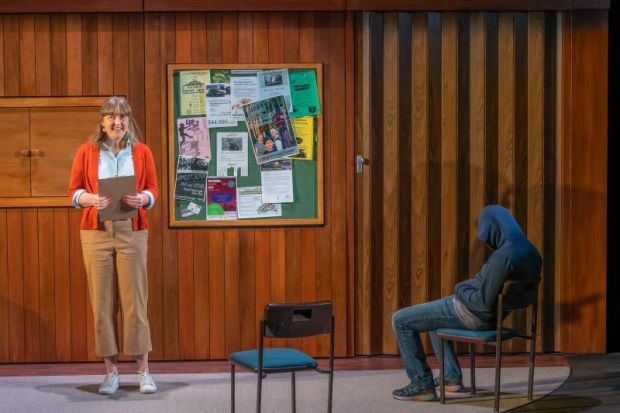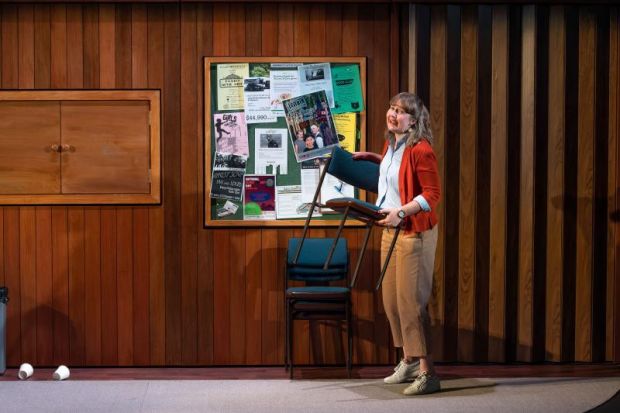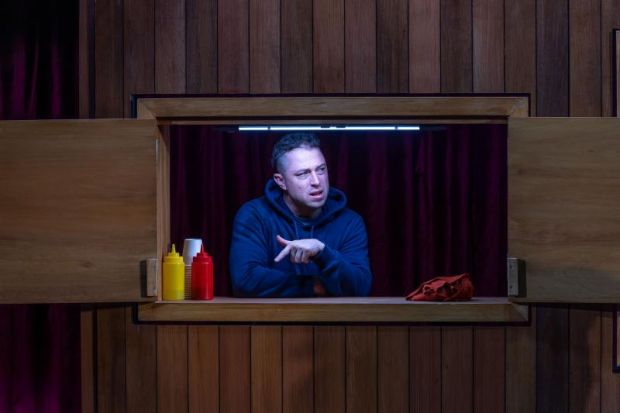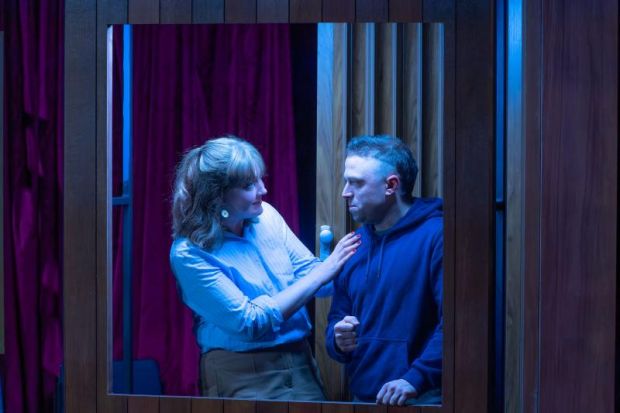Euphoria
Euphoria, written by Emily Steel, shines a light on the issues of mental health in ways that are both joyful and uncomfortable, all at the same time.
This production is one of the best pieces of theatre I have experienced in a very long time: exquisite acting, brilliant staging and direction, with a cleverly told story. This beautiful and, at times, hilariously funny piece, was written by Steel after research and conversations held with many people across towns in regional South Australia.
Having lived in small country town SA myself, the characters presented, and the issues approached, are very real. Humour in analysing the idiosyncrasies of the classic rural characters helps the audience journey through what is a difficult conversation about life in these isolated places and mental health. The Guardian newspaper notably commented that ‘People are walking around with really high levels of distress’ in an article discussing the issue of regional mental health. Euphoria peels away some of the layers in discussing this distress metaphorically and physically and allows the audience to become immersed in the story and invested in its outcome.
Euphoria, a product of Country Arts SA’s Arts and Health program, is poignantly directed by Nescha Jelk. She brings to the stage Steel’s work on how, paradoxically, life in rural Australia appears idyllic, but that there are challenges of wellbeing despite this happy exterior. Her direction has warmth and a sense of nostalgia but is also sharply perceptive in her use of space and compassion for the issues. The concept that living in a country town means everybody knows each other is a double-sided coin, in that this allows for familiarity and support, but at the same time, no-one’s business is their own. This paradox is explored throughout the play cleverly both through the dialogue and sharp acting, but also through the set design.
We can never know what others are going through at any time and what we see and how we respond is often superficial and only a small window into their lives. Meg Wilson has designed a set that physically places the characters IN these glimpses though small windows and doorways, creating a beautiful metaphor. As the play unfolds and the conversations open up, the set also expands to become more open - lives more visible. The design itself is very clever: utilising timber to portray materials common to spaces in a country town, and using elements found throughout a variety of spaces – halls, kitchens, schools, and the like.

Throughout the play, Jelk has the actors frequently unpacking items from bags or packaging, so we constantly are reminded of the need to ‘unpack’ mental health issues and open the conversation. Political correctness is also discussed in the play. This has some of us tongue-tied as to what we are ‘allowed’ to ask and say anymore and is portrayed beautifully in the dialogue by the school principal who discusses how we are afraid to ask how people are, for fear of ‘triggering’ others.
Lighting and sound (Nic Mollison and Andrew Howard) are used brilliantly to shock and transport. It switches us seamlessly from scene to scene, character to character.
The ‘onion’ that is this play is peeled superbly by the two actors: Ashton Malcolm and James Smith. There are not enough accolades to give this pair. Their vocal dexterity in playing many different characters, their ability to be fully in the moment for each ‘switch’, and their outstanding physicality, make this show. Smith is outstanding – particularly in the ability to physically command each character: from the busybody checkout lady at the local supermarket, to Ethan, the tortured country boy. He captures each perfectly and his ability to segue between characters is fluid and flawless. Malcolm, likewise, gives an effortless performance, tailoring mannerisms and vocals to the cross-gender characters she plays. These two actors deserve huge applause and certainly received it on opening night.

The audience are drawn into Euphoria from the moment it begins. WE are the people at the town meeting who are spoken to with great passion by Meg in her quest to put on a festival. WE are spoken to through the fourth wall and are privy to the internal dialogue of the characters. The style of writing used by Emily Steel is realistic, believable and immersive. It is commentary and observation, not a criticism of mental health and wellbeing, and how we are only just beginning to understand the complexities of the human mind. The journey is eye opening and compassionate.
Actress and activist Glenn Close said recently: ‘What mental health needs is more sunlight, more candour, more unashamed conversation’ – and this is what Euphoria brings. It leaves us with no concrete ending, but that is as it should be – the issue of mental health is an ongoing conversation that needs to be openly discussed and welcomed.
This is a brilliant piece of Australian theatre that absolutely should not be missed.
Shelley Hampton
Photographer: Chris Herzfeld, Camlight Productions

Subscribe to our E-Newsletter, buy our latest print edition or find a Performing Arts book at Book Nook.

